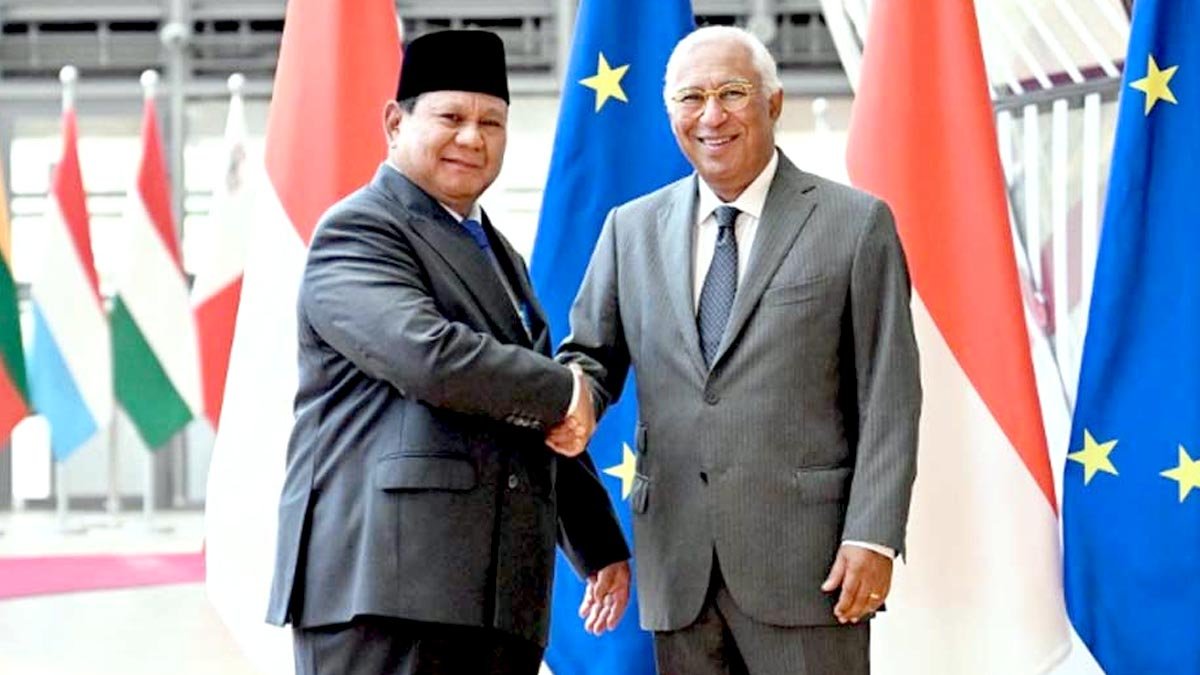PALMOILMAGAZINE, BRUSSELS — Indonesian President Prabowo Subianto began his official visit to the European Union headquarters with a bilateral meeting with President of the European Council, António Costa. Held at the Europa Building in Brussels on Sunday afternoon local time, the meeting marked a new chapter in Indonesia–EU relations.
President Prabowo was formally welcomed by President Costa and took part in a photo session in the flag hall before proceeding to the 11th floor meeting room. He was accompanied by key ministers, including Coordinating Minister for Economic Affairs Airlangga Hartarto, Minister of Trade Budi Santoso, Minister of Investment and Downstreaming/Head of BKPM Rosan Roeslani, Cabinet Secretary Teddy Indra Wijaya, and Indonesian Ambassador to Belgium, Andri Hadi.
This meeting was a significant milestone following 10 years of prolonged negotiations that finally resulted in a political agreement on the Indonesia–European Union Comprehensive Economic Partnership Agreement (IEU–CEPA). At a joint press conference, President Prabowo called the achievement a “historic day.”
“Today is a very historic day for me. After 10 years of negotiations that were often quite tough—we have finally reached a breakthrough,” said President Prabowo in a statement cited by Palmoilmagazine.com on Tuesday (July 15, 2025).
The President further emphasized that IEU–CEPA is not merely a trade agreement, but a symbol of mutual trust between two major global powers aiming to build an inclusive and value-based economic partnership. He stated that Indonesia is open to technology transfer, cooperation in clean energy, food security, and the downstreaming of critical minerals.
“We regard Europe as a very important region and hope it continues to play a central role in maintaining global peace and stability. The world is clearly shifting towards a multipolar order,” he added.
Prabowo also outlined his vision to expand cooperation in education and healthcare, while promoting a healthy and sustainable investment ecosystem for businesses from both sides. He invited the EU to view Indonesia as a strategic partner amid a rapidly evolving global landscape.
Following the bilateral meeting with the European Council President, Prabowo continued his diplomatic agenda with a meeting with European Commission President Ursula von der Leyen at the Berlaymont Building. During the meeting, von der Leyen outlined three main pillars to strengthen bilateral ties: trade, geopolitics and security, and people-to-people connectivity.
On trade, von der Leyen welcomed the political conclusion of IEU–CEPA, describing it as a strong signal of a long-term partnership grounded in trust and shared values.
“This new trade agreement will create huge opportunities for both our nations. It will open new markets and generate more opportunities across key industries—from automotive and agriculture to services and other sectors,” she said.
On geopolitics, von der Leyen proposed elevating EU–Indonesia relations to a strategic partnership, aiming to deepen cooperation in regional and global security—complementing Indonesia’s vital role in EU–ASEAN relations.
Lastly, on people-to-people connectivity, von der Leyen announced a new visa cascade system that simplifies access for Indonesian citizens traveling to the Schengen area. Under this policy, Indonesian nationals making a second visit to the EU will be eligible for a multi-entry visa.
“This will facilitate visits, investments, education, and personal connections. Essentially, we are building bridges between our people,” she concluded. (P2)
